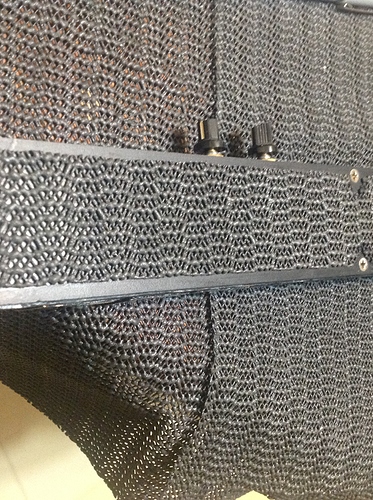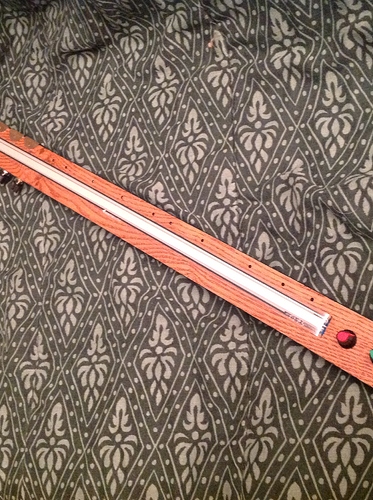Thanks Johannes, I'll get one and see how I go. Would be a nice little addon for an enclosure. My alternative was to build a keyboard out of buttons but that needs its own thread.
Softpot ribbon controller
Ok, I've made my ribbon controller, went for the duo-touch configuration. It all seems to work well, but ... (there is always a but) I can't seem to get the maths to work using the patcher.
My Gpio voltages are not linear, as expected, but getting the formula "y=x/(64.1-x)" is hard without any division object and no maths knowledge.
I tried using your demo patch, but that doesn't seem to give any result : the signal after the maths is the same as the one before.
I've managed to get a playable solution using the math/exp function, but it's still quite uneven along the ribbon.
Any idea ?
I don't think it can be done without a custom GPIO object. With my FSR I have to switch GPIO's between measuring pressure and measuring distance. Without doing this I always get some pressure modding creeping into the distance calculation. It's on my list to do up an object for this but it's way down the bottom.
i have the same thing. i made some sort of a keyboard with a resistor after each key and soldered it for the dual configuration. i am using the ribbon demo patch and i see the effect of keypressing in the scopes but no sound comes out. i understand the patch more or less only untill the two inputs are summed up. i guess i have to adjust something, but what. could someone give me a hand and explain the patch a bit more?
an old thread, but I'm very interested in the idea of building a ribbon controller and curious if anyone has been able to get the duo-touch configuration for the FSR to work as they were expecting? I'm thinking of building something similar the Coagula with the layered sensors... (and thank you for an earlier link to that build @mtyas)
Thank you @lokki ...I did see that post and that is what got me once again inspired to actually do it. I'll have to read it more closely this time. btw - Nice Bass! I still have my handcrafted JK Lado bass I purchased back in '79. 
Nothing fancy musically, just a first test of my ribbon controller prototype with position and pressure sensors, sending midi data from a Teensy Arduino to the Axoloti Core running the GM\041-Violin-mtyas patch. I mapped CC's to glide_1 and delay. I'm still working out the code to pitch bend note to note, and maybe make that piece of hardwood flooring into the enclosure with some pots and switches. Video courtesy of my iPad on a mic stand held with elastic bands. 
Second test of my ribbon controller running the tiar\synths\Dangerine patch. (thank you @SmashedTransistors) This time using arduino code written by '316K' (available on github) and adapted for use with the Teensy Arduino. When put into the enclosure, I'll flip the ribbon... because I am finding having pitch increase left to right a lot like driving on the left side of the road... I keep turning into the wrong lane. 
it took some time... but a really good vibe getting the standalone patch change happening using the switches of 2 rotary encoders I have available... I'd like to thank all you really great patchers of the Axoloti... you'll know your riff I hope. @johannes awesome product and price...
Added some note markers and have an idea for a clip-on axoloti core which would include some onboard controls 
Still need to add the guitar strap buttons.
I  my axoloti and will take good care of it... lol, while not musically perfect, I have a bad ear and a whole lot of fun... maybe someday I'll take time to perfect the arrangement, the song, the mix... but not now.
my axoloti and will take good care of it... lol, while not musically perfect, I have a bad ear and a whole lot of fun... maybe someday I'll take time to perfect the arrangement, the song, the mix... but not now. 
This is extremely exciting. I've wished for 20 years to be able to make an ondes Martenot and now I'm finally going to do it (I just ordered a softpot.)
Really nicely built! How is playing with it so far? and what kind of scaling do you use? linear or logaritmic maybe?
In general: Since every octave means a doubling in pitch a purely linear behaviour is not very practical. If the sensor itself acts linear, and it normally will because a doubling of the length will lead to a doubling of the registered resistance, one wil have to convert the signal soemwhere else along the way to solve the pitch issue.
I use a Doepfer R2M ribbon controller. It also offfers pressure sensitivity which adds another layer of expression, the most obvious choice being to attach the filter frequency to pressure. Furthermore it has a complete MIDI and CV interface on board and a lot of extra features like an arpeggiator.
It is however a bit underdeveloped as a Trautonium / Ondes Martenot type controller. You can for instance not set the velocity of the MIDI notes. Mine has been modified but as standard it always sends MIDI velocity value 127 with each note! It's a like Doepfer lost their way a bit after the solid state Trautonium project.
I actually designed a visual scale to help with playing melodies on ribbon contollers and also wrote an article about my experiences. You can find it here:
http://www.brassee.com/writing.html#pimp
Building a ribbon controller yourself is of course way cooler but the basic requirements and practical considerations are the same so this might still be off interest to some of you.
Marc
depends a bit if you want an emulation of a string or a floating piano roll. As a guitar player I would prefer the first, so yes converting the linear input makes sense 
I think to achieve one could combine two different sensors, like the softpot in combination with a capacitive touch sensor.
Thanks for sharing! I would be really intrigued by such an instrument/controllers but it is not really on my high priority. At the moment I'm exploring my diy fretless guitar, and with an ebow and some filters+effects in axoloti I can make sounds close to onde matenos / gliding synthesizer.
I stand totally corrected on that remark about the neccesity of the ribbon controllers scale being linear. How very Keyboard-centric of me! 
An advantage of a linaar layout is however that higher notes will have the same scale length as the lower ones. Most of us are no violin or frettless bass players and then a bit of leeway before serious detuning accidents occur can be an advantage.
Marc
combine a softpot for pitch with a force sensitive resistor below it for sending velocity... I used a guitar tuner to help me identify where to place some note markers... a great visual tool.






